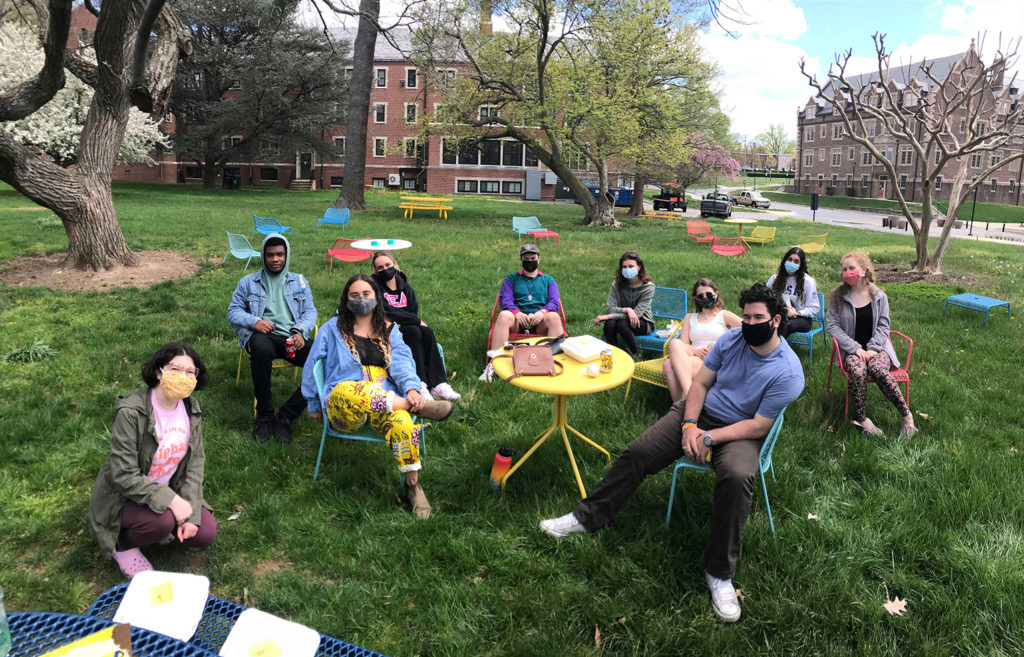
Hillels miss having in-person events, services and learning. Organic moments between students and staff in the hallway or in an office are the hardest things to recreate on Zoom. You can’t walk into someone’s office virtually.
As their universities require students and staff to be vaccinated and are starting to open up, Hillels hope to return in person, so they can have these moments again.
Johns Hopkins University Hillel
Johns Hopkins is returning to in-person classes and events in the fall, but the guidelines are still unclear. Anything could change at any given moment, said Monica Davis, the director of business operations at Hopkins Hillel.
One challenge will be meeting and integrating so many students into the community. This is because there will be two freshmen classes, since last year’s freshmen did not have the typical experience.
“It’s definitely going to be a challenge to try to integrate and get to know that many people, but I’m very excited for that,” said Alanna Margulies, student president of Hopkins Hillel.
Hopkins Hillel is excited to integrate these students into events like Shabbat. Shabbat has historically been their biggest program, and in the spring they could not have their meals or services in person. They are looking to bring this back in the fall.
During the pandemic, the Hillel has worked hard to support their students’ mental health.
[University campuses close, but Hillels don’t stop working]
In the spring, Davis went on walks with students, and one of the rabbis started a disc golf program. They wanted to get students outside with their peers.
Davis believes that students there “need a mom” when they’re away from home, especially during difficult times, and she wants to be that figure for them.
“I want students to feel like our Hillel is a home away from home,” Davis said.
UMBC Hillel
The Hillel at the University of Maryland, Baltimore County, has to be adaptable and ready to change at any moment in the coming months. Hillel staff there are still unsure if they will be able to return to campus in the fall.
“I don’t know if I can be face to face with my students next semester,” said Rabbi Jeremy Fierstien, the executive director of UMBC Hillel.
UMBC will have a lot more in-person classes, and some organizations will be able to transition back to in person too. However, the Hillel has not yet been informed if they will be able to.
As a result, the Hillel will have two programs in the fall that can be offered either virtually or in person. These programs include a cohort hosted by Resetting the Table, an organization that facilitates conversations about the Israeli-Palestinian conflict, and the Jewish Learning Fellowship, Fierstien said.
During this past year, UMBC Hillel’s programs were entirely virtual. In fact, it was during the worst of the pandemic, Fierstien said, that their Hillel was “strangely successful.”
The virtual environment allowed students to attend events and interact with their peers without leaving their room. Also, the Hillel had higher turnout, and many students wanted to connect, something that was hard to do with COVID-19 restrictions.
“People were starved for community,” Fierstien said.
While UMBC Hillel does appreciate the turnout they got during the pandemic, they would love to return to in-person programming. Fierstien believes that hospitality is important, and he loves making his students feel welcome and comfortable. He feels like he cannot do this as well virtually.
“I can’t give you a cup of tea on a Zoom call,” he said.
Towson University Hillel
Every morning, Lisa Bodziner, executive director of Towson Hillel, thinks about being able to have daily, typical interactions with her students again. Even if it’s just a student talking about their exam or how stressed they are, it means so much to be able to connect with them, she said.
[You Should Know … Lisa Bodziner]
She is excited for Towson to be 100% reopened next semester.
After this past spring break, Towson Hillel started doing outdoor Shabbat events and meals, in line with safety guidelines. In addition, Towson Hillel had meal deliveries for those who were not comfortable being in person. They will continue this in the fall, along with livestreaming services and classes to cater to everyone’s comfort levels.
In addition to being more comfortable, virtual may still be easier for some people. Board members could participate in meetings from home and some students could learn remotely.
“Sometimes the remote world is going to be more convenient for people,” Bodziner said.
While it may be more convenient, Bodziner believes there is nothing like being in person and being able to talk to anyone who walks into the lounge at the Hillel or anyone hanging out during the lunch hour.
“There’s incredible hype around everyone being together in person and supporting each other socially, intellectually, religiously and community wise,” Bodziner said.
There is still some uncertainty for what the upcoming semester holds for all Hillels, but one thing is clear: They will do whatever they can to support their students during this time.
“I always say the most empowering thing about being a Hillel professional [is that] we have the opportunity to change the course of a student’s life,” Bodziner said.







